Tonight is the 89th Oscars show. Nominated for the Best Actress in a Leading Role award is French actress Isabelle Huppert (1953) for her amazing turn in Elle (2016). Huppert plays a top exec for a video game company who turns the tables after being raped in her own home. The versatile and brave actress has appeared in more than 90 film and television productions since 1971. She won 89 awards for her work, but the Oscar nomination for Elle is her first.
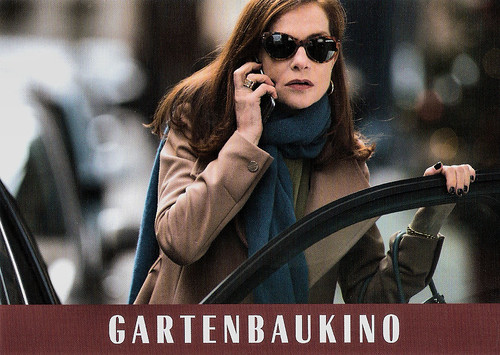
Austrian promotion card by Gartenbaukino, Wien. Photo; publicity still for Elle (Paul Verhoeven, 2016).

Romanian postcard by Casa Filmului Acin.
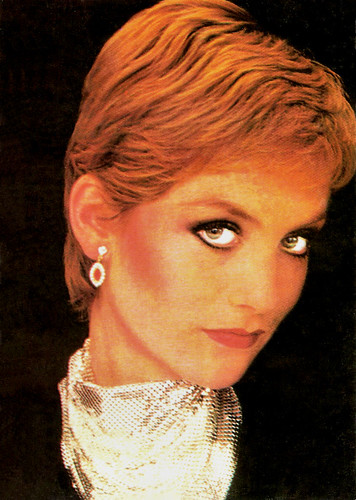
Romanian postcard by Casa Filmului Acin.
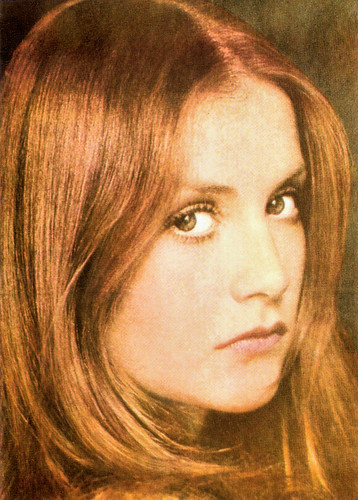
Romanian postcard by Casa Filmului Acin.
Isabelle Anne Madeleine Huppert was born in Paris in 1953 (some sources say 1955). She is the youngest of five daughters of Annick Beau, a teacher of English, and Raymond Huppert, a safe manufacturer. At age 13, she announced her intention to be an actor and was encouraged by her mother. She studied at the Versailles Conservatoire and later attended the CNSAD (National Conservatory of Dramatic Art of Paris).
Huppert made her film debut in Faustine et le bel été/Faustine and the Beautiful Summer (Nina Companeez, 1972). Five years later, she had already appeared in 15 films and worked with major directors. She played Romy Schneider's younger sister in César et Rosalie/Cesar and Rosalie (Claude Sautet, 1972).
In Bertrand Blier’s road movie Les valseuses/Going Places (1974), she played a bored teenager who runs off with three young vagabonds (Gérard Depardieu, Patrick Dewaere and Miou-Miou). For director Otto Preminger, Huppert made her English-language debut in Rosebud (1975) starring Peter O’Toole.
Her international breakthrough came with her guileless performance as a simple, provincial girl destroyed by a summer romance with a middle-class student in La Dentelliere/The Lacemaker (Claude Goretta, 1977). For this unforgettable portrayal, she was awarded both a BAFTA (British Academy Award) and a David di Donatello (the Italian Oscar).
At the next Cannes Film Festival, she won the Best Actress award for Violette Nozière (Claude Chabrol, 1978). In this true story, she portrayed a woman who scandalized France in 1933 by casually poisoning her parents. She tied the award with Jill Clayburgh.
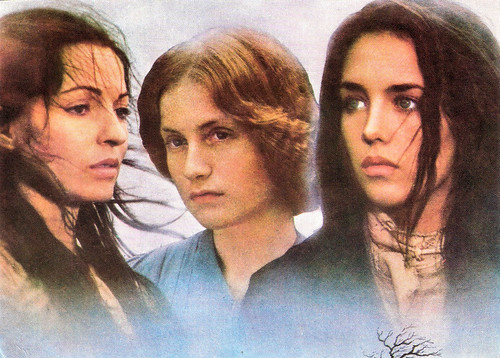
Romanian postcard by Casa Filmului Acin. Photo: publicity still for Les soeurs Brontë/The Bronte Sisters (André Téchniné, 1979) with Marie-France Pisier as Charlotte Bronte, Isabelle Huppert as Anne Bronte, and Isabelle Adjani as Emily Brontë.
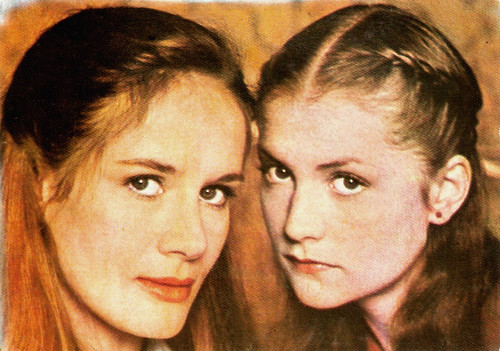
Dominique Sanda and Isabelle Huppert. Romanian postcard by Casa Filmului Acin. Publicity still for Les ailes de la colombe/The Wings of the Dove (Benoît Jacquot, 1981).

French postcard by Editions La Malibran, Nancy, in the collection Cinéma Couleur, no. MC 39. Publicity still for Loulou (Maurice Pialat, 1979) with Gérard Depardieu.
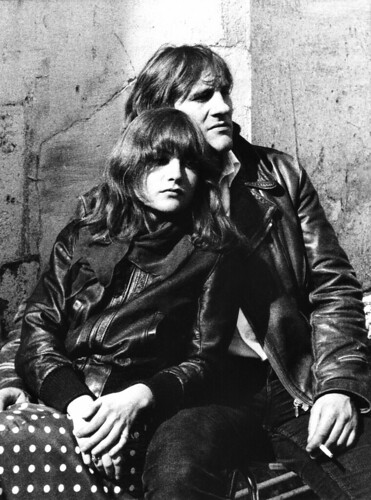
French card. Photo: publicity still for Loulou (Maurice Pialat, 1980).
Isabelle Huppert made her American film debut in the blockbuster Heaven's Gate (Michael Cimino, 1980), which proved to be a legendary disaster at the box office. In France, she continued to explore enigmatic and emotionally distant characters, such as an upper-class woman who is physically attracted by a young vagabond (Gérard Depardieu) in Loulou (Maurice Pialat, 1980), a prostitute in Sauve qui peut (la vie)/Slow Motion (Jean-Luc Godard, 1980), the mistress of Philippe Noiret’s character in Coup de torchon/Clean Slate (Bertrand Tavernier, 1981) and a Jewish refugee in Coup de foudre/Entre nous (Diane Kurys, 1983).
She used her influence to help non-commercial projects get off the ground, like Joseph Losey's La Truite/The Trout (1982) and sister Caroline Huppert's Signé Charlotte/Sincerely, Charlotte (1984).
For her role in Une Affaire de Femmes/Story of Women (Claude Chabrol, 1988), she received the Volpi Cup for Best Actress at the Venice Film Festival. This time, she tied with Shirley MacLaine. She won the Volpi Cup again for her role in La Cérémonie (Claude Chabrol, 1995) as a shy but manic and homicidal post-office mistress in a French village. This time she tied the award with her co-star in that film, Sandrine Bonnaire. For La Cérémonie, she also won her only César award.
The offspring of her cinematic relationship with director Claude Chabrol also includes the widely acclaimed literary adaptation Madame Bovary (1991), the crime comedy Rien ne va plus/The Swindle (1997), and the thriller Merci pour le chocolat/Thanks for the Chocolate (2000).
Stuart Jeffries in The Observer about their cooperation: “Huppert has excelled in the spiteful, the nasty, the unpleasant and - regularly - the murderous. More than that, she carries herself with imperious intelligence and thus seems to be self-conscious about her own wickedness. No doubt that is why Chabrol has cast her so often. He's interested in guilt, manipulativeness and shame - all of which she loves portraying.”
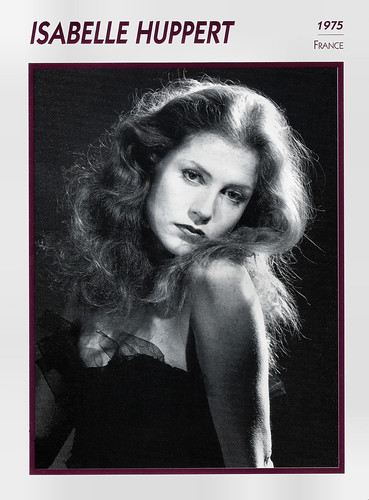
French collectors card in the series 'Portrait de Stars; L'encyclopédie du Cinéma' by Edito Service, 1994. Photo: Harcourt. Caption: France, 1975.

French postcard, no. 222.
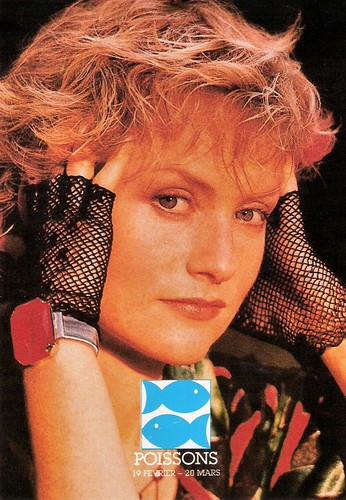
French postcard by Editions F. Nugeron in the Signes Zodiaque series, no 8, Isabelle Huppert - Poissons (Pisces).

French postcard by Humour a la Carte, Paris, no. ST-159.
In 2001, Isabelle Huppert started a new interesting collaboration with Austrian film director Michael Haneke. In La Pianiste/The Piano Teacher (Michael Haneke, 2001), an adaptation of the novel by Nobel prize winner Elfriede Jelinek, she plays a sexually repressed and self-destructive piano teacher, who embarks on a dark journey into sadomasochism. Regarded as one of her most impressive turns, her performance won the 2001 acting prize at the Cannes Film Festival. The film also took the Grand Prix (second prize) and was greeted with a mixture of boos and applause, provoking the main debate of the festival. Huppert continued to work hard. In 2002, the entire cast of the popular black comedy 8 femmes/8 Women (François Ozon, 2002), also including Catherine Deneuve, Danielle Darrieux and Fanny Ardant, was voted Best Actress at the European Film Awards. The same cast won a Silver Bear for Outstanding Artistic Contribution, at the 2002 Berlin film festival.
Then Huppert was back at the set with Haneke for the disturbing Le temps du loup/The Time of the Wolf (Michael Haneke, 2003) with Béatrice Dalle. In Ma mere/My Mother (Christophe Honoré, 2004) based on a novel by George Bataille, Huppert starred as an attractive middle-aged mother who has an incestuous relationship with her teenage son (Louis Garrel). Since Heaven's Gate, Huppert only made a few more American movies. In The Bedroom Window (Curtis Hanson, 1987) she played Steve Guttenberg’s mistress, and in Amateur (Hal Hartley, 1994) a former nun writing porn. In I [Heart] Huckabees (David O. Russell, 2004) she portrayed author Catherine Vauban, nemesis of existential detectives Dustin Hoffman and Lily Tomlin.
At the 2005 Venice Film Festival, Huppert received a special Lion for her role in Gabrielle (Patrice Chéreau, 2005). The following year, she reunited with Claude Chabrol for L'ivresse du pouvoir/The Comedy of Power (2006). On the Paris stage, she appeared as the suicidal Hedda Gabler, in Henrik Ibsen's play. In 1994 she was made Chevalier (Knight) of the Ordre national du Mérite and in 2005 she was promoted to Officier (Officer). She was also made Chevalier (Knight) of the Légion d'honneur in 1999 and was promoted to Officier (Officer) in 2009. With her spouse, director Ronnie Chammah, she has three children: actress Lolita Chammah (1983), Lorenzo Chammah (1986) and Angelo Chammah (1997). Huppert likes to keep her private life private though. Her work is her main issue in interviews.
In 2012, two of her films competed for the Palme d'Or at Cannes: Amour/Love (Michael Haneke, 2012) and the South Korean production Da-reun na-ra-e-seo/In Another Country (Sang-soo Hong, 2012). Her part as the daughter of Jean-Louis Trintignant and Emmanuelle Riva in Amour also got her another César nomination. In Valley of Love (Guillaume Nicloux, 2015, she reunited with Gérard Depardieu. They play two famous actors who used to be a couple and had a son 25 years ago. They reunite after the son's death and receive a letter asking them to visit five places at Death Valley, which will make the son reappear. Valley of Love was selected to compete for the Palme d'Or at the 2015 Cannes Film Festival.
Elle (Paul Verhoeven, 2016) was a provocative and disturbing comedy-thriller that divided many film fans. Elle got rave reviews in leading newspapers but was snubbed by the jury of the Cannes Film Festival and by the Academy in the 2016 Best Foreign Language Film Category. To me, it's one of the wildest and most disturbing films of this century in the disguise of a stylish thriller. Xan Brooks at The Guardian: "Turn off the lights and let the horror begin. Paul Verhoeven’s new film, Elle, is an outrageous black comedy, volatile and deadly; a film that opens up with a sexual assault and then cleans off the blood ahead of a posh restaurant dinner. (...) Huppert gives a performance of imperious fury, holding the audience at bay, almost goading us to disown her. Audaciously, Elle presents her not so much as a victim but as the casualty of a world she is very much a part of; maybe (still more troublingly) an accessory to." Isabelle Huppert's recent credits include several stage appearances and TV series and such films as Jerzy Skolimowski's IO/EO (2022) and Mrs. Harris Goes to Paris (Anthony Fabian, 2022), as well as the thriller La Syndicaliste/The Sitting Duck (Jean-Paul Salomé, 2023). In 2024, she starred in her third collaboration with Hong Sang-soo in A Traveler's Needs (2024) which won the Grand Jury Prize at the 2024 Berlin Film Festival. Huppert is the owner of the repertory cinemas Christine Cinéma Club and Ecoles Cinéma Club in Paris, which her son Lorenzo curates.
Trailer Coup de torchon/Clean Slate (1981). Source: WorleyClarence (YouTube).
Trailer Amour/Love (2012). Source: MovieclipsTrailers (YouTube).
French trailer Elle (Paul Verhoeven, 2016). Source: cinémaniak (YouTube).
Sources: Stuart Jeffries (The Observer), Xan Brooks (The Guardian) Rebecca Flint Marx (AllMovie - Page now defunct), Yahoo! Movies (Page now defunct), Wikipedia and IMDb.
This post was last updated on 3 November 2024.

Austrian promotion card by Gartenbaukino, Wien. Photo; publicity still for Elle (Paul Verhoeven, 2016).

Romanian postcard by Casa Filmului Acin.

Romanian postcard by Casa Filmului Acin.

Romanian postcard by Casa Filmului Acin.
Casually poisoning her parents
Isabelle Anne Madeleine Huppert was born in Paris in 1953 (some sources say 1955). She is the youngest of five daughters of Annick Beau, a teacher of English, and Raymond Huppert, a safe manufacturer. At age 13, she announced her intention to be an actor and was encouraged by her mother. She studied at the Versailles Conservatoire and later attended the CNSAD (National Conservatory of Dramatic Art of Paris).
Huppert made her film debut in Faustine et le bel été/Faustine and the Beautiful Summer (Nina Companeez, 1972). Five years later, she had already appeared in 15 films and worked with major directors. She played Romy Schneider's younger sister in César et Rosalie/Cesar and Rosalie (Claude Sautet, 1972).
In Bertrand Blier’s road movie Les valseuses/Going Places (1974), she played a bored teenager who runs off with three young vagabonds (Gérard Depardieu, Patrick Dewaere and Miou-Miou). For director Otto Preminger, Huppert made her English-language debut in Rosebud (1975) starring Peter O’Toole.
Her international breakthrough came with her guileless performance as a simple, provincial girl destroyed by a summer romance with a middle-class student in La Dentelliere/The Lacemaker (Claude Goretta, 1977). For this unforgettable portrayal, she was awarded both a BAFTA (British Academy Award) and a David di Donatello (the Italian Oscar).
At the next Cannes Film Festival, she won the Best Actress award for Violette Nozière (Claude Chabrol, 1978). In this true story, she portrayed a woman who scandalized France in 1933 by casually poisoning her parents. She tied the award with Jill Clayburgh.

Romanian postcard by Casa Filmului Acin. Photo: publicity still for Les soeurs Brontë/The Bronte Sisters (André Téchniné, 1979) with Marie-France Pisier as Charlotte Bronte, Isabelle Huppert as Anne Bronte, and Isabelle Adjani as Emily Brontë.

Dominique Sanda and Isabelle Huppert. Romanian postcard by Casa Filmului Acin. Publicity still for Les ailes de la colombe/The Wings of the Dove (Benoît Jacquot, 1981).

French postcard by Editions La Malibran, Nancy, in the collection Cinéma Couleur, no. MC 39. Publicity still for Loulou (Maurice Pialat, 1979) with Gérard Depardieu.

French card. Photo: publicity still for Loulou (Maurice Pialat, 1980).
Legendary disaster
Isabelle Huppert made her American film debut in the blockbuster Heaven's Gate (Michael Cimino, 1980), which proved to be a legendary disaster at the box office. In France, she continued to explore enigmatic and emotionally distant characters, such as an upper-class woman who is physically attracted by a young vagabond (Gérard Depardieu) in Loulou (Maurice Pialat, 1980), a prostitute in Sauve qui peut (la vie)/Slow Motion (Jean-Luc Godard, 1980), the mistress of Philippe Noiret’s character in Coup de torchon/Clean Slate (Bertrand Tavernier, 1981) and a Jewish refugee in Coup de foudre/Entre nous (Diane Kurys, 1983).
She used her influence to help non-commercial projects get off the ground, like Joseph Losey's La Truite/The Trout (1982) and sister Caroline Huppert's Signé Charlotte/Sincerely, Charlotte (1984).
For her role in Une Affaire de Femmes/Story of Women (Claude Chabrol, 1988), she received the Volpi Cup for Best Actress at the Venice Film Festival. This time, she tied with Shirley MacLaine. She won the Volpi Cup again for her role in La Cérémonie (Claude Chabrol, 1995) as a shy but manic and homicidal post-office mistress in a French village. This time she tied the award with her co-star in that film, Sandrine Bonnaire. For La Cérémonie, she also won her only César award.
The offspring of her cinematic relationship with director Claude Chabrol also includes the widely acclaimed literary adaptation Madame Bovary (1991), the crime comedy Rien ne va plus/The Swindle (1997), and the thriller Merci pour le chocolat/Thanks for the Chocolate (2000).
Stuart Jeffries in The Observer about their cooperation: “Huppert has excelled in the spiteful, the nasty, the unpleasant and - regularly - the murderous. More than that, she carries herself with imperious intelligence and thus seems to be self-conscious about her own wickedness. No doubt that is why Chabrol has cast her so often. He's interested in guilt, manipulativeness and shame - all of which she loves portraying.”

French collectors card in the series 'Portrait de Stars; L'encyclopédie du Cinéma' by Edito Service, 1994. Photo: Harcourt. Caption: France, 1975.

French postcard, no. 222.

French postcard by Editions F. Nugeron in the Signes Zodiaque series, no 8, Isabelle Huppert - Poissons (Pisces).

French postcard by Humour a la Carte, Paris, no. ST-159.
Greeted with a mixture of boos and applause
In 2001, Isabelle Huppert started a new interesting collaboration with Austrian film director Michael Haneke. In La Pianiste/The Piano Teacher (Michael Haneke, 2001), an adaptation of the novel by Nobel prize winner Elfriede Jelinek, she plays a sexually repressed and self-destructive piano teacher, who embarks on a dark journey into sadomasochism. Regarded as one of her most impressive turns, her performance won the 2001 acting prize at the Cannes Film Festival. The film also took the Grand Prix (second prize) and was greeted with a mixture of boos and applause, provoking the main debate of the festival. Huppert continued to work hard. In 2002, the entire cast of the popular black comedy 8 femmes/8 Women (François Ozon, 2002), also including Catherine Deneuve, Danielle Darrieux and Fanny Ardant, was voted Best Actress at the European Film Awards. The same cast won a Silver Bear for Outstanding Artistic Contribution, at the 2002 Berlin film festival.
Then Huppert was back at the set with Haneke for the disturbing Le temps du loup/The Time of the Wolf (Michael Haneke, 2003) with Béatrice Dalle. In Ma mere/My Mother (Christophe Honoré, 2004) based on a novel by George Bataille, Huppert starred as an attractive middle-aged mother who has an incestuous relationship with her teenage son (Louis Garrel). Since Heaven's Gate, Huppert only made a few more American movies. In The Bedroom Window (Curtis Hanson, 1987) she played Steve Guttenberg’s mistress, and in Amateur (Hal Hartley, 1994) a former nun writing porn. In I [Heart] Huckabees (David O. Russell, 2004) she portrayed author Catherine Vauban, nemesis of existential detectives Dustin Hoffman and Lily Tomlin.
At the 2005 Venice Film Festival, Huppert received a special Lion for her role in Gabrielle (Patrice Chéreau, 2005). The following year, she reunited with Claude Chabrol for L'ivresse du pouvoir/The Comedy of Power (2006). On the Paris stage, she appeared as the suicidal Hedda Gabler, in Henrik Ibsen's play. In 1994 she was made Chevalier (Knight) of the Ordre national du Mérite and in 2005 she was promoted to Officier (Officer). She was also made Chevalier (Knight) of the Légion d'honneur in 1999 and was promoted to Officier (Officer) in 2009. With her spouse, director Ronnie Chammah, she has three children: actress Lolita Chammah (1983), Lorenzo Chammah (1986) and Angelo Chammah (1997). Huppert likes to keep her private life private though. Her work is her main issue in interviews.
In 2012, two of her films competed for the Palme d'Or at Cannes: Amour/Love (Michael Haneke, 2012) and the South Korean production Da-reun na-ra-e-seo/In Another Country (Sang-soo Hong, 2012). Her part as the daughter of Jean-Louis Trintignant and Emmanuelle Riva in Amour also got her another César nomination. In Valley of Love (Guillaume Nicloux, 2015, she reunited with Gérard Depardieu. They play two famous actors who used to be a couple and had a son 25 years ago. They reunite after the son's death and receive a letter asking them to visit five places at Death Valley, which will make the son reappear. Valley of Love was selected to compete for the Palme d'Or at the 2015 Cannes Film Festival.
Elle (Paul Verhoeven, 2016) was a provocative and disturbing comedy-thriller that divided many film fans. Elle got rave reviews in leading newspapers but was snubbed by the jury of the Cannes Film Festival and by the Academy in the 2016 Best Foreign Language Film Category. To me, it's one of the wildest and most disturbing films of this century in the disguise of a stylish thriller. Xan Brooks at The Guardian: "Turn off the lights and let the horror begin. Paul Verhoeven’s new film, Elle, is an outrageous black comedy, volatile and deadly; a film that opens up with a sexual assault and then cleans off the blood ahead of a posh restaurant dinner. (...) Huppert gives a performance of imperious fury, holding the audience at bay, almost goading us to disown her. Audaciously, Elle presents her not so much as a victim but as the casualty of a world she is very much a part of; maybe (still more troublingly) an accessory to." Isabelle Huppert's recent credits include several stage appearances and TV series and such films as Jerzy Skolimowski's IO/EO (2022) and Mrs. Harris Goes to Paris (Anthony Fabian, 2022), as well as the thriller La Syndicaliste/The Sitting Duck (Jean-Paul Salomé, 2023). In 2024, she starred in her third collaboration with Hong Sang-soo in A Traveler's Needs (2024) which won the Grand Jury Prize at the 2024 Berlin Film Festival. Huppert is the owner of the repertory cinemas Christine Cinéma Club and Ecoles Cinéma Club in Paris, which her son Lorenzo curates.
Trailer Coup de torchon/Clean Slate (1981). Source: WorleyClarence (YouTube).
Trailer Amour/Love (2012). Source: MovieclipsTrailers (YouTube).
French trailer Elle (Paul Verhoeven, 2016). Source: cinémaniak (YouTube).
Sources: Stuart Jeffries (The Observer), Xan Brooks (The Guardian) Rebecca Flint Marx (AllMovie - Page now defunct), Yahoo! Movies (Page now defunct), Wikipedia and IMDb.
This post was last updated on 3 November 2024.
Great pics of Isabelle. Some I hadn't seen before
ReplyDelete